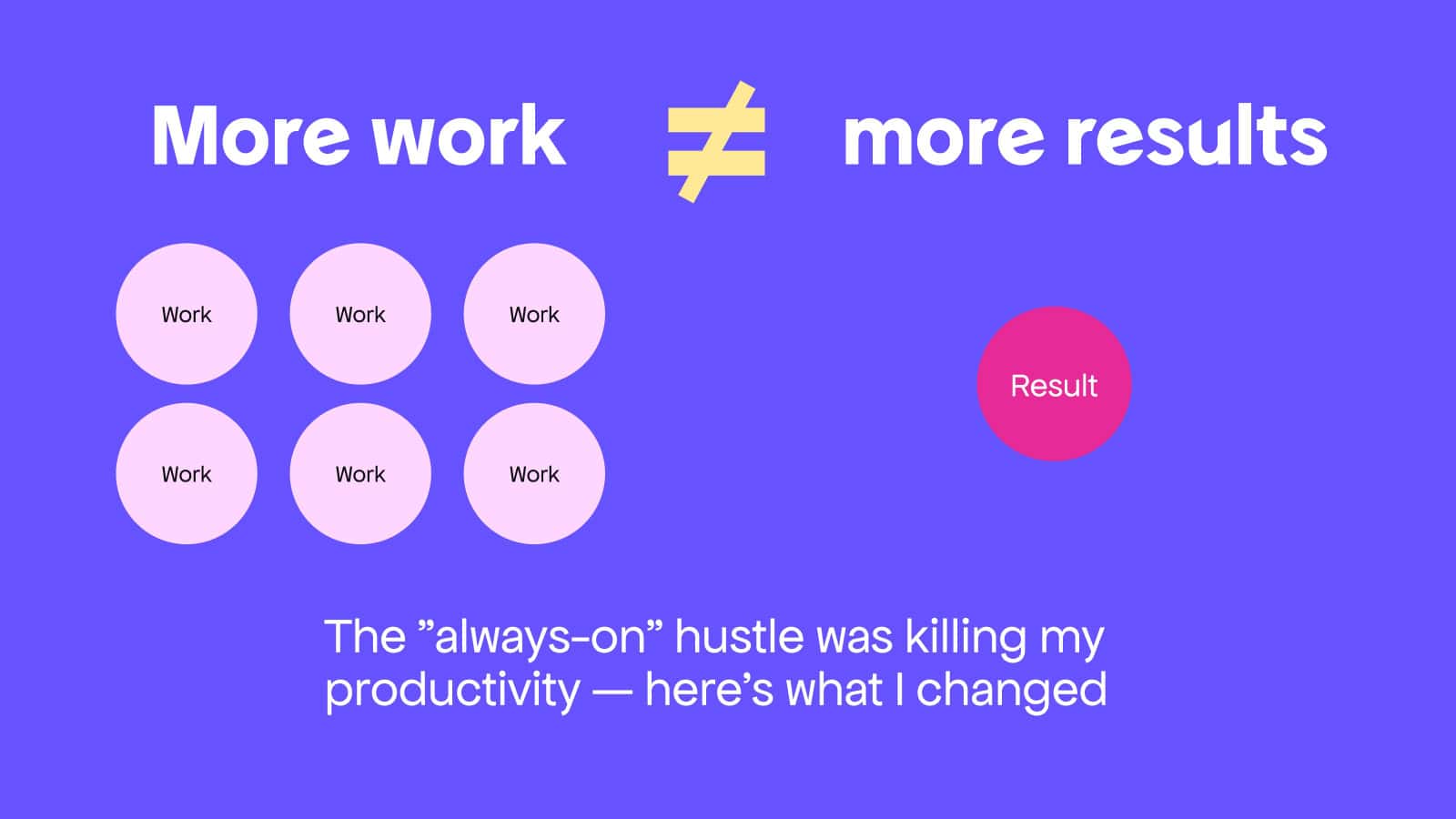|
|
Five months into my WordPress writing career, I watched a rerun of an old Top Gear episode where Jeremy Clarkson admits that he doesn’t know a thing about how engines work. I couldn’t help but chuckle. Put it this way — if I were a motor journalist and WordPress was a sports car, my journey so far has been documenting specs/features and learning about the engineers and designers behind them. But did I understand the mechanics — the code and the software? Did I know anything about what fuels the project’s engine — aka contributing to WordPress?

Nope…
But I do now.
Contributing to WordPress
An Open Source Roadmap to Fulfill the Promise of the WordPress Project
The inner workings of WordPress’s engine are manifold. And to further complicate matters, the engineers — the devs — constantly overhaul it to try and improve the software’s performance and functionality (often with mixed results).
While researching my recent article 56 WordPress Experts to Follow Online, I discovered that the ecosystem’s success is largely attributable to its open source nature which advocates community contribution via the WordPress Project.
Part master plan, part manifesto, part community forum.
This intrigued me, but it also raised some questions in my mind. I was knowledgeable enough about open source software and what it entails, but — simply put — I couldn’t figure out why so many developers were contributing to the WordPress Project free of charge. And seemingly with genuine enthusiasm, too.
I set out on a research road trip to find out more about open source, and specifically how it translates into the WordPress Project. I invite you to be the James May to my Jeremy Clarkson and join me on my travels to ‘contribution country’ where I learn the ins and outs of the WordPress Project and determine if contributing to WordPress is worth it.
But first:
A (Non-Vehicular) Crash Course in Open Source Software
Before I get into contributing to the WordPress Project, I’ll share a brief history and breakdown of open source software for better context. If you don’t need to be enlightened, feel free to skip ahead ✌

The term open source was coined by Christine Peterson at a conference in 1998. It describes Silicon Valley companies that pioneered open source software and went on to net huge investments from Wall Street (leading to the infamous Silicon Valley tech bubble).
For the first time, software code was made available to the public at no charge. This followed in the wake of the free software movement of the 1980s (which was triggered by a jammed printer at MIT). The big difference between open source software and free software is that — confusingly — you have to pay to access and modify the latter. Both software practices are ideologies in their own right, and the battle between them rages on.
As a concept, open-source isn’t hard to grasp. It’s when you unpack the specifics that things can get complex.
Open source software refers to source code that can be inspected, modified, enhanced, and distributed by anyone because it is publicly accessible and not proprietary. Source code is used by programmers to build computer programs and software, and it’s usually never seen by end-users (dudes like me, basically). Open source software is also protected by different public licenses, most notably the GNU General Public License (GPL). Today, open source is fundamental to SaaS and other modern software products and maintained by millions of developers on mega-platforms like GitHub.
How Open Source Software Facilitates the WordPress Project
What Is the WordPress Project?
After a fair bit of sleuthing, I discovered that there is no single definition of the WordPress Project. But it has been in the works for almost 20 years, following WordPress’s launch in 2003.
WordPress is the WordPress Project and vice versa.
Can the WordPress Project ever be ‘completed’? WordPress has always been open source, meaning the latest version is freely available for anyone to download, use, and customize. What’s more, the software doesn’t belong to any single person or company* since it’s continuously modified by tens of thousands of developers and other WordPress contributors. As WordPress itself states on the Meta team’s Projects page, there will always be things that simply ‘need to get done’.
If you use WordPress to generate an income in any way, you are encouraged — some would say expected — to contribute to the WordPress Project. This is the magic recipe behind the secret sauce: every contribution, in any form, is a vital ingredient to WordPress’s success. The only way that the WordPress Project could ever be completed is — theoretically — if the platform itself was deleted or the project discontinued.
*You’re probably wondering how WordPress makes money if no one technically owns it. Check out this article that illustrates it via the analogy of being gifted a Ford Mustang (they had me there).
How to Contribute to WordPress
As I got deeper into my research, I was surprised to learn that contributing to the WordPress Project is not limited to development or engineering. Anyone who is involved in the community — from writers and designers to event organizers and photographers — is encouraged to chip in.
It’s easy to get involved: visit Make.WordPress.org and sign up for any of the more than twenty teams:
- Core
- Design
- Mobile
- Accessibility
- Polyglots
- Support
- Documentation
- Themes
- Plugins
- Community
- Meta
- Training
- Test
- TV
- Marketing
- CLI
- Hosting
- Tide
- Openverse
- Photos
- Project
You’re bound to find one or more where your particular skills or interests can be of value. Joining also offers opportunities to connect and network with like-minded peers — most of these teams have dedicated Slack channels where WordPress contributors post queries and facilitate weekly meetings to discuss projects, tickets, and updates.
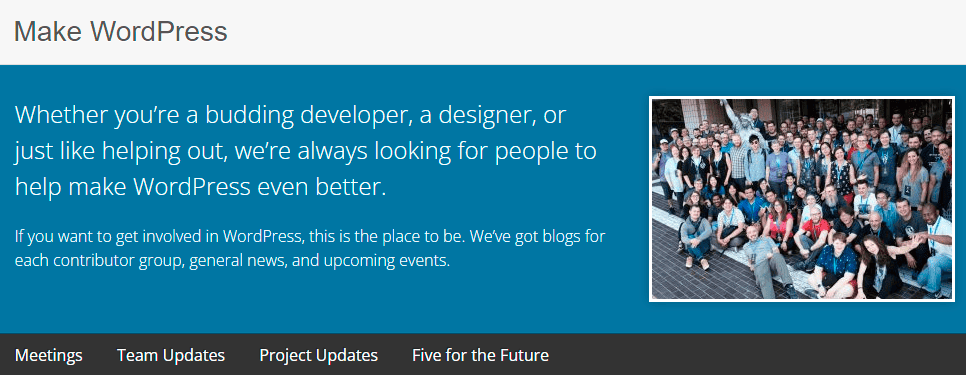
This WordPress.org guide shows you exactly how you can start contributing to WordPress:
- To contribute as an individual, you’ll need to create an account and configure your profile.
- If you or your organization wants to pledge five percent of your resources, visit this page.
Speaking of five percent…
Five for the Future
Launched by Matt Mullenweg in 2014, Five for the Future encourages business entities that profit from WordPress — individuals or organizations — to dedicate five percent of their resources to contributions that advance the software.
Why five percent?
Firstly, Five for the Future’s proposition is rooted in the Four Freedoms of open source software:
- The freedom to inspect or view. This means having access to the code to study and reconstruct it as you wish.
- The freedom to use. To be able to ‘run or otherwise execute the software, product, or process.’
- The freedom to modify. Adapting the software to ultimately improve it and increase its value.
- Economic freedom. Selling or distributing products or services you have created using the software.
Secondly, Five for the Future’s 1/20 ‘golden ratio’ (5% to 95%) is a realistic representation of the amount of WordPress-based businesses to end-users. As Allie Nimmons puts it: ‘The 4 Freedoms gives you the philosophy, and Five for the Future gives you a plan.’
How an individual or organization decides to distribute five percent of their resources to the WordPress Project is up to them. They can spend five percent of their workday on resolving logged tickets or donate five percent of their revenue towards organizing WordCamps and local meetups. Some organizations — like Yoast — even designate employees to contribute to WordPress full-time.
As I went deeper down the contributions rabbit hole, my unwavering inner critic said that all of this sounded a little too good to be true. Essentially, the WordPress Project expects people to sacrifice time and resources to maintain a software program that they use to generate an income. In other words, to do more work to work in the first place.
To go deeper into ‘contribution country’, I had a session with Freemius CEO Vova Feldman to discuss my findings and skepticisms, and to glean his insights as an experienced WordPress contributor.
Grab a free copy of our Cheat Sheet for
Selling Plugins and Themes
A growth roadmap with concise, actionable tips for every milestone of WordPress product development.

Contributing to the WordPress Project Has Its Problems
Vova agreed that issues do arise as a result of the project’s open-door-all-welcome policy. Moreover, they are especially poignant at a time when WordPress’s market share is shrinking due to frustrated end-users and lagging updates.
These are the key issues that we discussed.
You Get a Badge, You Get a Badge…

Did you know that developers can earn badges on their Google profiles when they learn and master new skills and help others?
Well, in WordPress, you stand to get contributor and team badges added to your profile for good deeds (contributions). As per the Meta Handbook: ‘The contributor badges are generally assigned to anyone who has contributed to a particular team. Meanwhile, the team badges are given to those who are active on their team.’ Different badges can be earned on different teams. For instance, Plugin contributors won’t be able to earn a Marketing badge unless they join and contribute to the Marketing team, and vice versa.
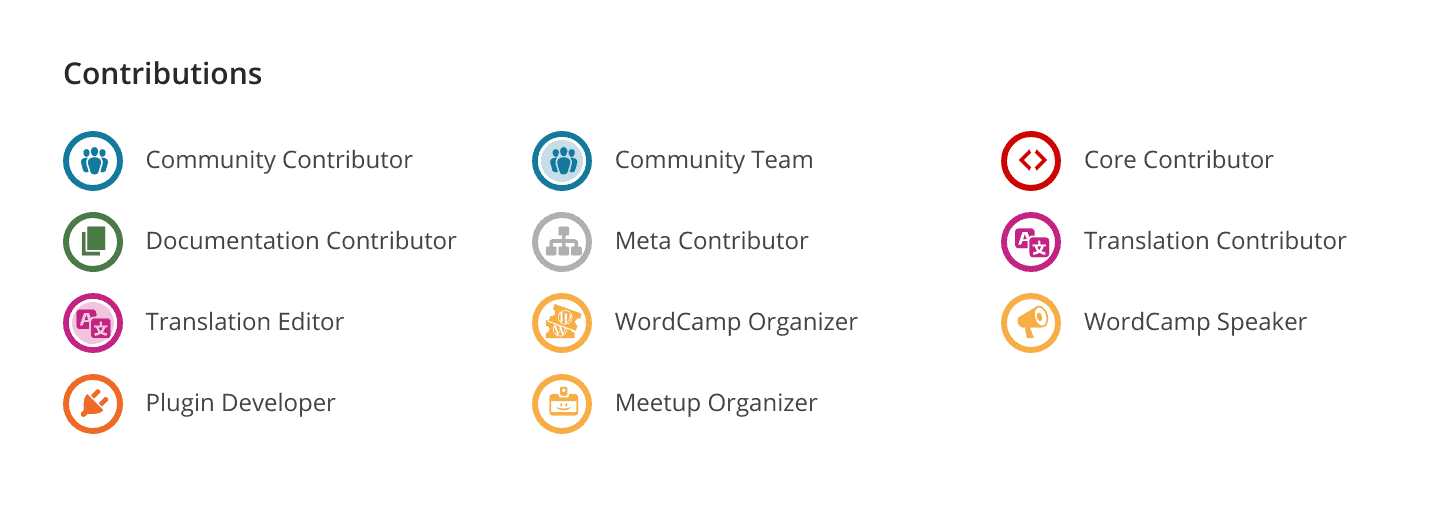
Badges and recognition aren’t necessarily that hard to obtain. When new versions of WordPress are released, everyone who contributed gets a badge. Additionally, their names are listed in a tab on the official release page. Even if they made a small contribution — literally as small as adding a comment to a code — their name will be listed.
In other words, inexperienced or less devoted WordPress contributors can receive recognition and exposure for doing less than other (more passionate) contributors. While there is certainly some merit to this inclusivity, it feels unfair towards contributors who devoted long hours and serious effort to releases.
Anyone Can Volunteer…
… and many of the people volunteering are not professionals. Of course, this is part of the premise of open source and the WordPress Project itself. Anyone and everyone can sign up to be a WordPress contributor if they meet the requirements (which are not particularly stringent).
As a result, some of the software gets built by amateurs and hobbyists as opposed to professionals who understand not only how WordPress is built, but also how updates should translate into the real world for end-users. The professionals still lead the way and make up the majority of contributors, but faulty contributions by amateurs lead to updates and new versions of WordPress being delayed.
Newcomers Lack Familiarity With the Software
New contributors usually don’t have the understanding and experience of those who’ve worked on the WordPress Project for a long time; potentially since the beginning. Certain practices may seem illogical to new contributors, but veterans have learned through trial and error why some things work and others don’t. It should be mentioned, however, that new contributors often bring new, fresh perspectives to the WordPress Project.
Too Many Cooks Spoil the Broth

People from all walks of life, nationalities, and cultures can sign up as WordPress contributors. Their perspectives on how to advance the software are often based on personal experiences, both socially and digitally. Democratic and utilitarian as this may be, it also means that software updates tend to progress slowly since everyone wants to have a say.
Adding to this complex chorus of opinions, Team Leads try to listen and satisfy everyone. Consequently, problems take longer to resolve since making decisions often involves pivoting between different courses of action before committing to one. When there is something particularly divisive, Matt Mullenweg – CEO of Automattic – or other key people will usually intervene if a course of action is misaligned with the direction they believe the software should move in.
This underpins an additional point of contention: Many contributors in the WordPress community feel displeasure at being dictated to and question how ‘open source’ such interventions are.
In my opinion, this isn’t a bad thing. A vehicle the size of WordPress with an engine fueled by contributing to the ‘Project’ will crash if it’s left on autopilot. Ultimately, it needs a driver behind the wheel who can slam the brakes, shift down a gear, and steer it back on the road if it starts to veer off course.
Learning From Past Mistakes Is Difficult
Meeting facilitators — a subdivision of the Documentation contributions team — are expected to attend all Slack meetings for the contribution team they are allocated to. Their job is to schedule meetings, create and publish agendas, moderate proceedings and announce agenda items, and ask for a ‘notetaker’ to volunteer to take the minutes.
Based on his experience with TRT (Themes Review Team), Vova relayed that volunteers regularly come and go. This ‘revolving door’ means new members will often question practices or even challenge decisions that were already debated and resolved years ago, albeit without their knowing. Understandably, the repeated motions of bringing new volunteers up to speed can be frustrating for contributors who have been part of a team for a long time. But this is unfair — volunteers simply can’t be expected to learn the history of every team meeting as a requirement before joining, since this would be impractical and time-consuming.
Moreover, up to a few years ago, the practice of taking notes during meetings and sharing them publicly on Make.WordPress.org was not yet protocol. This is something that leadership acknowledged, and they put documentation practices in place for record-keeping and transparency. Even so, taking minutes from every meeting doesn’t necessarily mean you can use them to learn from or rectify past mistakes because — again — poring over every line of documentation will take up too much time.
It’s not just about past mistakes or decisions, either. With so many differing opinions and agendas muddying the waters, the way forward is often unclear or delayed.
Learning about the above issues was insightful, but it still didn’t answer my real question. If recognition is unevenly distributed, inexperienced contributors slow down updates, and dedicating time and resources pro bono makes no sense from a business perspective, why does the community feel so passionate about contributing to the WordPress Project?
Memoirs of a Polyglot (AKA When Copywriters Contribute)
It dawned on me that most people who criticize pineapple on pizza have probably never tried it before. Ergo, it’s hypocritical to point fingers at the WordPress Project when I’ve yet to contribute myself.
And it didn’t take me long to discover how I could get involved…
As a South African who can speak both English and Afrikaans, I could offer my translation services to the Polyglots team. This is how I did it:
After creating my WordPress account and profile, I scrolled down Make.WordPress.org’s homepage until I found the Polyglots column.
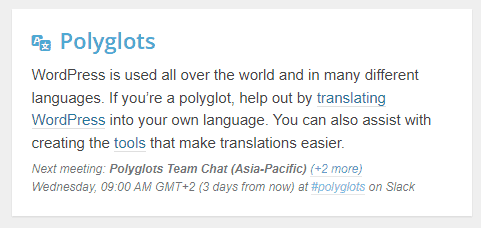
This directed me to the Translate WordPress landing page, where I clicked on ‘existing language team’ and scrolled down to ensure that Afrikaans was indeed listed.

After clicking through, I was directed to the site for the Afrikaans team.

From here, I studied a guide about the team’s work process, read the joining criteria (I was only required to be fluent and literate in Afrikaans), and followed instructions on how to sign up.
I could contribute an English-to-Afrikaans translation, which would be reviewed by a PTE (Project Translation Editor) or GTE (General Translation Editor). Once reviewed, the PTE or GTE would determine whether the quality conformed to a certain standard. If it did, I would automatically qualify as a PTE (in addition to being a contributor).
This meant I could approve, reject, or edit new translation submissions to any projects that piqued my interest. This chapter from the Translator’s Handbook provides more detail on the requirements and responsibilities of Translation Editors if you’re interested.
To cut a long story short, I decided to contribute translations to WordPress Version 6.0, where six pieces of English language were individually tabbed and yet to be translated.
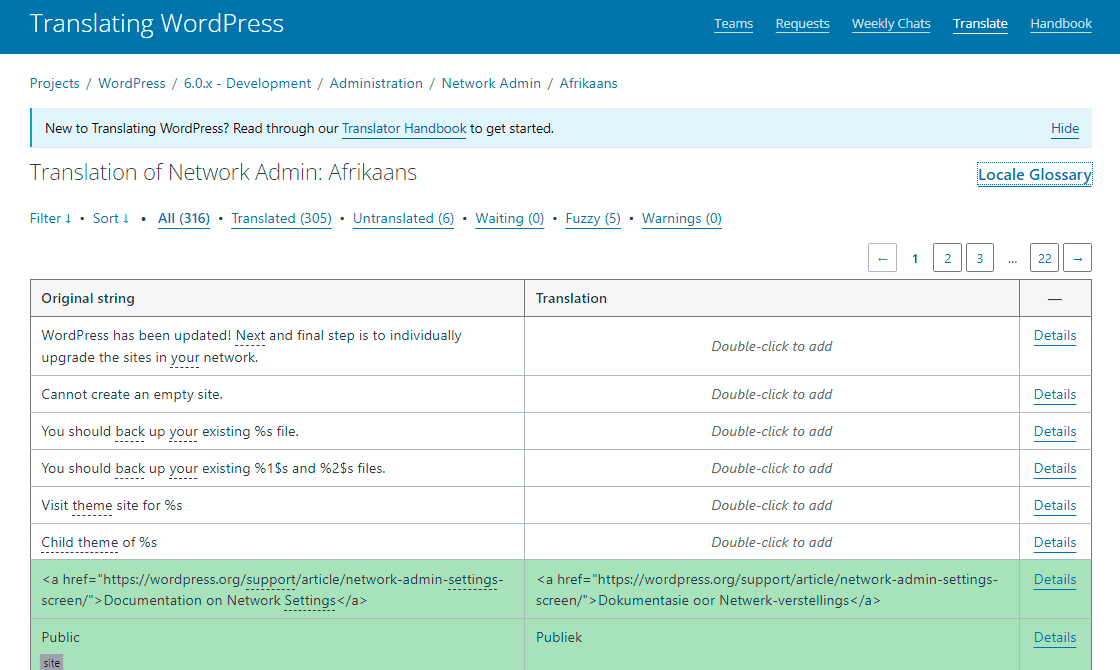
I consulted the Locale Glossary, which includes approved Afrikaans translations of obscure or unique concepts and words — such as ‘child theme’ — and started suggesting translations for each tab of content:

Easy as that. Now I simply had to wait for my suggested translations to be approved, rejected, or edited by a GTE or PTE.

And just like that, I was no longer an observer of the project, but a bonafide contributor. After my adventure as a polyglot, I felt the skepticism waning and resumed my conversations with Vova to learn more about the benefits of contributing to WordPress.
Slowly, the picture was coming together for me…
The (Sometimes Taboo) Perks of Contributing to WordPress
There’s no other way to put this — contributing to WordPress genuinely made me feel like I did some good. It’s empowering, too, and gives you a chance to have your say on team forums and Slack channels. Plus, it feels like you have a stake in shaping the future of the platform that powers almost 43% of the web.
That said, there’s another (somewhat taboo) reason contributing to WordPress can be fruitful. It’s considered impolite to talk about, but it doesn’t help dancing around the topic either. As much as it’s in the community’s interest to contribute to the software, so too does it benefit both individuals and businesses from a commercial standpoint.
Money, Money, Money
For larger organizations, the commercial benefits of contributing to the WordPress Project can be worth millions of dollars. Here’s an example:
If a WordPress user is looking for a hosting company after downloading a theme from WordPress.org, they will probably end up on this page.
These hosting companies are being recommended because, in all likelihood, they made a significant contribution to the ecosystem, and this is WordPress’s (read: Automattic’s) way of pushing their services into the broader spotlight. Whether clout is being used to position certain companies as the top solutions due to behind-closed-door dealings is another (controversial) matter. And one that goes against the championed ethics of an open source community, if there’s any truth to the statement.
Similarly, WordPress.org lists organizations that have pledged to contribute to Five for the Future by:
- Describing what the organization does
- Adding a small image of each member that contributed, and:
- Stipulating how many hours per week the organization dedicated to Five for the Future
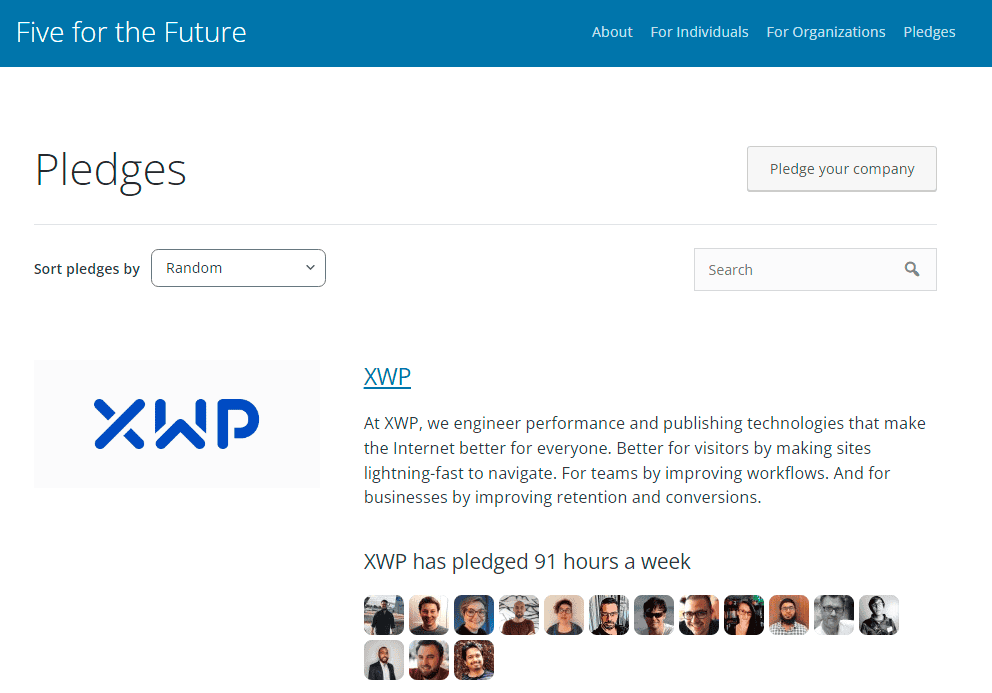
The above illustrates that there are indeed commercial benefits to contributing to WordPress, which is not to say that they are necessarily bad or wrong. In many ways, contributing on a commercial level is a give-and-take situation:
Companies that pledge to Five for the Future — or in other ways — may find they have greater choice when it comes to recruitment and investment due to increased exposure. Similarly, and if the contributions are large enough, said companies may even find they’re on the inside track when it comes to ‘big picture’ decisions about the future of WordPress. For the ecosystem as a whole, large contributions indicate that a good amount of time and resources are being used to improve WordPress, which is exactly how it should be in an open source environment. Whether that gives businesses with more cash and resources an unfair advantage and greater influence is another story…
You Get a Badge, You Get a Badge (Part II)
Remember when I said that badges are problematic because they’re awarded too easily? Well, there’s a big perk to them, too.
Badges don’t only look cool on your profile – they also serve as a CV of sorts for potential employers. If a software company has to pick between two plugin developers and one has the badge but the other doesn’t… see what I’m getting at? Moreover, software-based companies look good in turn when their employees have badges to show off on their profiles.
WordPress also understands that badges benefit the software as a marketing tool. Once a contributor gets a badge, they are likely to share it on their social channels, which could entice their followers to start contributing and earn badges themselves.
Contributing Is a Fantastic Means of Networking
Not only with other contributors but with Team Leads, too.
Team Leads usually have deep experience with the WordPress ecosystem and community. As such, they are highly influential. On each contribution team page, Team Lead profile pictures link to their profiles, while the rest of the contributors only have their names displayed. Thus, Team Leads get tons of exposure.
For newcomers or solopreneurs seeking opportunities, contributing to WordPress projects is a great way to network with these ‘influencers’, potentially opening doors that can advance careers.
Speaking of networking…
WordCamps Are Great Recruitment Grounds for Nurturing the WordPress Project
Team Leads are usually present at WordCamps and facilitate meet-and-greets with new or aspiring contributors. Once you’ve met a Team Lead, you’ll probably feel more confident about sending them a DM on Slack/Twitter.
Moreover, budding contributors won’t need to go through the motions of setting up a contribution framework or learning the ropes to get involved. Usually, Team Leads will gladly help and share information with them. Why? Because they won’t need to train new contributors and can nip many potential mistakes in the bud, which saves them a lot of time. This also allows Team Leads to mold contributors by showing them the way they want things done.
The WordPress Project Is Self-Sustaining
WordPress itself — specifically Automattic — also benefits from the WordPress Project. While some logistical headaches (and ethical questions) certainly arise from essentially having volunteers instead of employees working on the WordPress Project, the pros do outweigh the cons when looking at the long game.
Besides the fact that contributors get to play a role in dictating the direction that WordPress should take, making noteworthy contributions to the WordPress Project can prove to be extremely profitable for businesses. On the professional front, contributions as a means of networking can lead to rapid career advancement for individuals.
My road trip into ‘contribution country’ took a few interesting turns. Signing up as a polyglot resolved most of my initial reservations/doubts about the WordPress Project and highlighted why contributing for free is a major win-win for all involved.
It opened my eyes to the fact that…
Contributing to WordPress is the Key to the Sports Car
I wrote this article because I wanted to understand if contributing to the WordPress Project for free is worth it, or whether it’s an implausible, outdated practice that hasn’t been questioned enough by the community.
While unfair recognition, lagging updates, and questionable governance are certainly problematic, the positive, well-meaning principles at the heart of contribution can’t be denied. The fact is that WordPress has a large pool of passionate contributors with various skill sets who are continuously — and gladly — improving and advancing the software for free.
The WordPress Project is an unprecedented initiative that can’t be found elsewhere. The community is working towards a common goal, on a global scale, while each of us forges a career doing something we love within the ecosystem.
If you ask this humble polyglot, that’s pretty special.
And as long as the passion exists, so too will the WordPress Project and its continued advancement.
If you weren’t familiar with open source software and contributing to the WordPress Project before reading this article, it is my sincere hope that it will inspire you to jump in and get your hands dirty just as much as it did me. Keep your eyes open for new ways to get involved and start getting your foot in the door — who knows where it could lead to😉







